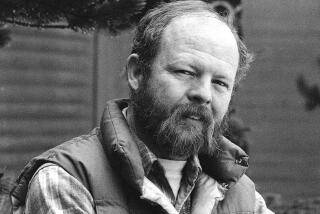Habitat for Humanity founder
- Share via
Millard Fuller, a self-made millionaire who gave away his wealth to start the Christian house-building group Habitat for Humanity, and who started a similar organization after he was fired over disputes with the Habitat board, died Tuesday en route to a hospital in Albany, Ga. He was 74.
An autopsy was being performed to determine the cause of death. Fuller had recently been treated for chest congestion and was taking antibiotics, said a spokeswoman for the Fuller Center for Housing.
Habitat for Humanity, founded in 1976 and based in Americus, Ga., built more than 175,000 houses in 100 countries under Fuller’s leadership and attracted prominent volunteers, including former President Carter. The Fuller Center for Housing, founded in 2005, raises money for Habitat affiliates.
Hundreds of thousands of low-income families that had been living in substandard housing benefited from Habitat’s no-interest mortgages. Would-be homeowners had to make a small down payment and spend a certain number of hours building their home along with volunteers.
In a statement Tuesday, Carter called Fuller “one of the most extraordinary people I have ever known.
“He used his remarkable gifts as an entrepreneur for the benefit of millions of needy people around the world by providing them with decent housing,” Carter said. “As the founder of Habitat for Humanity and later the Fuller Center, he was an inspiration to me, other members of our family and an untold number of volunteers who worked side by side under his leadership.”
In 1996, Fuller received the Presidential Medal of Freedom, the nation’s highest civilian honor.
Fuller’s legacy was tainted in early 2005 when a former employee said he had sexually harassed her, about 15 years after at least five other former employees had made similar claims. Fuller denied the allegations, and the Habitat board of directors said it could not substantiate the charges. Nonetheless, he was fired.
Fuller attributed his ouster to his continuous efforts to expand the organization’s operations.
Millard Fuller was born in Lanett, Ala., on Jan. 3, 1935, to a farming family. He graduated from Auburn University in 1957 and enrolled in law school at the University of Alabama.
He and a fellow law student, Morris S. Dees Jr., started a direct-mail business with the simple mission to “get rich,” Fuller said. Dees would later co-found the Southern Poverty Law Center in Montgomery, Ala.
The partners were earning $15,000 a year before they finished law school in 1960. After passing the bar, Fuller served in the Army, then returned to Alabama to open a law office with Dees. They also became publishers, starting with “Favorite Recipes of Home Economics Teachers” (1963). After two years, they stopped practicing law and became the largest cookbook-publishing operation in the United States. By the age of 29, Fuller was a millionaire.
Success brought stress and tensions in his relationship with his wife, Linda, whom he had married in 1959. After long discussions, they decided to sell almost everything they owned and give away the proceeds.
Fuller moved his family to Koinonia Farm, a multiracial religious commune in Americus, and developed business plans for the group. He spent two months in Africa with the Church of Christ.
On their return to Koinonia Farm, Fuller and his wife decided to rebuild the faltering community with its founder, Clarence Jordan. From that decision grew the concept of building no-interest housing for the poor.
The Fullers returned to Zaire (now Congo) in 1973. Fuller, as the Church of Christ’s director of development for the region, started a home-building program for local residents and raised money for prosthetic limbs and eyeglasses. They returned to Georgia in 1976, and Habitat for Humanity was born.
“We want to make shelter a matter of conscience,” Fuller told the Chicago Tribune. “We want to make it socially, politically, morally and religiously unacceptable to have substandard housing and homelessness.”
In addition to his wife, survivors include four children and eight grandchildren.
More to Read
Sign up for Essential California
The most important California stories and recommendations in your inbox every morning.
You may occasionally receive promotional content from the Los Angeles Times.










